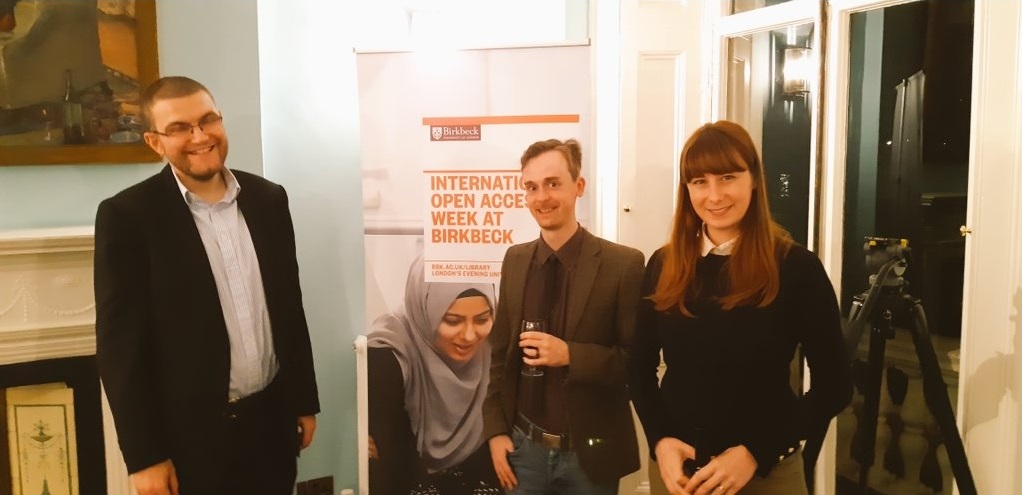For International Open Access Week 2018, Birkbeck Library held a panel discussion exploring the future and the radical potential of open access publishing. Melissa Steiner, Assistant Librarian, reports on the event.

What would the world look like if access to knowledge was free? This was the question we at the Library asked our students during International Open Access week, 22-28 October. Many responses cited advantages not only to students’ own education but also to the development of knowledge across the world, with the winning answer stating it would ‘unleash people’s potential… Who knows what people could achieve if the barriers to education were removed?’
The theme of International Open Access week this year was Designing Equitable Foundations for Open Knowledge. At Birkbeck, we considered this theme through a panel event held in the Keynes Library entitled Open Access: process, ethics and possibilities. This was chaired by Sarah Lee, Head of Research Strategy Support at Birkbeck and was held the day after the launch of Birkbeck’s new Research Office.
The first speaker was Martin Paul Eve, Professor of Literature, Technology and Publishing here at Birkbeck and member of the UUK Open Access Monographs Working Group. His presentation considered the implications of HEFCE’s proposed mandate that monographs will be required to be made available open access (OA) for the REF in 2020. Martin laid bare the (high) costs of monograph publishing, and considered funding options for OA publishing in the humanities. He concluded that time was running out for a framework to be built to make this mandate possible, given that the various options available would have repercussions for one or more stakeholders.
The second speaker was Simon Bowie, a library systems worker at SOAS, University of London. He has worked on the implementation and support of open-source systems in HE libraries. Simon’s talk focussed on the radical and disruptive potential of using open source software/infrastructure in libraries. He critiqued the assumption that technology is neutral and proposed an alternative to the hold proprietary software companies have over libraries, urging systems librarians to consider the ethical implications of the software they use and realise the potential that open source offers.
The final speaker was Lucy Lambe, Scholarly Communications Officer at the LSE. Lucy’s talk focused on an initiative at LSE in which researchers were paired with comics creator Karen Rubins, who developed the abstract of their academic articles into comic strips. The success of this initiative demonstrates the power of open licensing (in this case Creative Commons) and open access publishing. The research, which may have been otherwise inaccessible to those outside of the university, was turned into something more easily disseminated to the non-academic public, an important factor when considering how much research is publically funded, and increased the researchers’ impact.
Birkbeck Library was very pleased to be able to bring together a panel with the expertise and thought-provoking insights of our speakers, and it was an excellent opener to the rest of OA week which included sessions on using open access resources, understanding green & gold open access, a DOI for data/ORCID drop in, and of course, the Open Access board game all run by library staff.
Removing barriers to accessing knowledge is an issue close to the heart of library and information workers and we look forward to next years’ International Open Access Week!